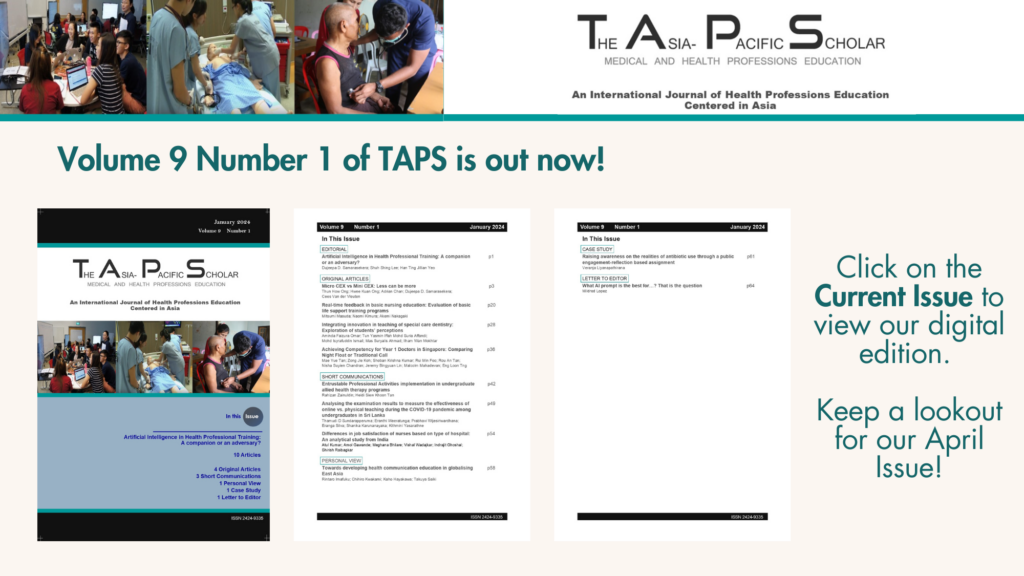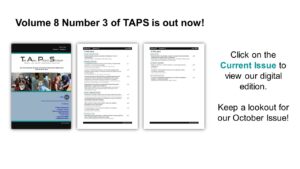A review of development approaches for Artificial Intelligence chatbots in medical education
Submitted: 19 August 2022
Accepted: 1 February 2023
Published online: 4 July, TAPS 2023, 8(3), 72
https://doi.org/10.29060/TAPS.2023-8-3/MA1603
Christopher See1*, Cynthia Sin Nga Lam2* & Yalsin Yik Sum Li2
1School of Biomedical Sciences, Faculty of Medicine, The Chinese University of Hong Kong, Hong Kong; 2Hospital Authority, Hong Kong
*Authors contributed equally
References
Chang, C. Y., Hwang, G. J., & Gau, M. L. (2022). Promoting students’ learning achievement and self‐efficacy: A mobile chatbot approach for nursing training. British Journal of Educational Technology, 53(1), 171-188. https://doi.org/10.1111/bjet.13158
Huang, W., Hew, K. F., & Gonda, D. E. (2019). Designing and evaluating three chatbot-enhanced activities for a flipped graduate course. International Journal of Mechanical Engineering and Robotics Research, 8(5), 813-818. https://doi.org/10.18178/ijmerr.8.5.813-818
Inkster, B., Sarda, S., & Subramanian, V. (2018). An empathy-driven, conversational artificial intelligence agent (Wysa) for digital mental well-being: Real-world data evaluation mixed-methods study. JMIR mHealth and uHealth, 6(11), e12106. http://doi.org/10.2196/12106
Lam, C. S. N., Li, Y. S., Chan, L. K., & See, C. (2019, November 11). Can the A.I.natomy chatbot teach anatomy? [Poster presentation]. 2nd Korea University International Medical Student Conference, Korea University, Seoul, Korea.
Li, C., Zhang, X., Chrysostomou, D., & Yang, H. (2022). ToD4IR: A humanised task-oriented dialogue system for industrial robots. IEEE Access, 10, 91631-91649. https://doi.org/10.1109/ACCESS.2022.3202554
Schlögl, S., Doherty, G., & Luz, S. (2015). Wizard of Oz experimentation for language technology applications: Challenges and tools. Interacting with Computers, 27(6), 592-615. https://doi.org/10.1093/iwc/iwu016
See, C., Lam, C. S. N., Li, Y. S., & Chan, L. K. (2019, May 31). Methods for training an AI for Higher Education [Poster presentation]. Centre for Information Technology in Education Research Symposium 2019, Faculty of Education, the University of Hong Kong, Hong Kong.
Suleman, R. M., Mizoguchi, R., & Ikeda, M. (2016). A new perspective of negotiation-based dialog to enhance metacognitive skills in the context of open learner models. International Journal of Artificial Intelligence in Education, 26, 1069-1115. https://doi.org/10.1007/s40593-016-0118-8
Kron, F. W., Fetters, M. D., Scerbo, M. W., White, C. B., Lypson, M. L., Padilla, M. A., Gliva-McConvey, G. A., Belfore II, L. A., West, T., Wallace, A.M., Guetterman, T. C., Schleicher, L. S., Kennedy, R. A., Mangrulkar, R. S., Cleary, J. F., Marsella, S. C., Becker, D. M. (2017). Using a computer simulation for teaching communication skills: A blinded multisite mixed methods randomized controlled trial. Patient Education and Counseling, 100(4), 748-759. https://doi.org/10.1016/j.pec.2016.10.024
Ward, T., Falconer, L., Frutos-Perez, M., Williams, B., Johns, J., & Harold, S. (2016). Using virtual online simulations in Second Life® to engage undergraduate psychology students with employability issues. British Journal of Educational Technology, 47(5), 918-931. https://doi.org/10.1111/bjet.12307
Weizenbaum, J. (1966). ELIZA – A computer program for the study of natural language communication between man and machine. Communications of the ACM, 9(1), 36-45.
*Christopher See
Rm 610S, 6/F, Choh-Ming Li Basic Medical Sciences Building,
The Chinese University of Hong Kong, Shatin, New Territories,
Hong Kong Special Administrative Region, China
+852 3943 0465
Email: christophersee@cuhk.edu.hk
Announcements
- Fourth Thematic Issue: Call for Submissions
The Asia Pacific Scholar is now calling for submissions for its Fourth Thematic Publication on “Developing a Holistic Healthcare Practitioner for a Sustainable Future”!
The Guest Editors for this Thematic Issue are A/Prof Marcus Henning and Adj A/Prof Mabel Yap. For more information on paper submissions, check out here! - Best Reviewer Awards 2023
TAPS would like to express gratitude and thanks to an extraordinary group of reviewers who are awarded the Best Reviewer Awards for 2023.
Refer here for the list of recipients. - Most Accessed Article 2023
The Most Accessed Article of 2023 goes to Small, sustainable, steps to success as a scholar in Health Professions Education – Micro (macro and meta) matters.
Congratulations, A/Prof Goh Poh-Sun & Dr Elisabeth Schlegel! - Best Article Award 2023
The Best Article Award of 2023 goes to Increasing the value of Community-Based Education through Interprofessional Education.
Congratulations, Dr Tri Nur Kristina and co-authors! - Volume 9 Number 1 of TAPS is out now! Click on the Current Issue to view our digital edition.

- Best Reviewer Awards 2022
TAPS would like to express gratitude and thanks to an extraordinary group of reviewers who are awarded the Best Reviewer Awards for 2022.
Refer here for the list of recipients. - Most Accessed Article 2022
The Most Accessed Article of 2022 goes to An urgent need to teach complexity science to health science students.
Congratulations, Dr Bhuvan KC and Dr Ravi Shankar. - Best Article Award 2022
The Best Article Award of 2022 goes to From clinician to educator: A scoping review of professional identity and the influence of impostor phenomenon.
Congratulations, Ms Freeman and co-authors. - Volume 8 Number 3 of TAPS is out now! Click on the Current Issue to view our digital edition.

- Best Reviewer Awards 2021
TAPS would like to express gratitude and thanks to an extraordinary group of reviewers who are awarded the Best Reviewer Awards for 2021.
Refer here for the list of recipients. - Most Accessed Article 2021
The Most Accessed Article of 2021 goes to Professional identity formation-oriented mentoring technique as a method to improve self-regulated learning: A mixed-method study.
Congratulations, Assoc/Prof Matsuyama and co-authors. - Best Reviewer Awards 2020
TAPS would like to express gratitude and thanks to an extraordinary group of reviewers who are awarded the Best Reviewer Awards for 2020.
Refer here for the list of recipients. - Most Accessed Article 2020
The Most Accessed Article of 2020 goes to Inter-related issues that impact motivation in biomedical sciences graduate education. Congratulations, Dr Chen Zhi Xiong and co-authors.









